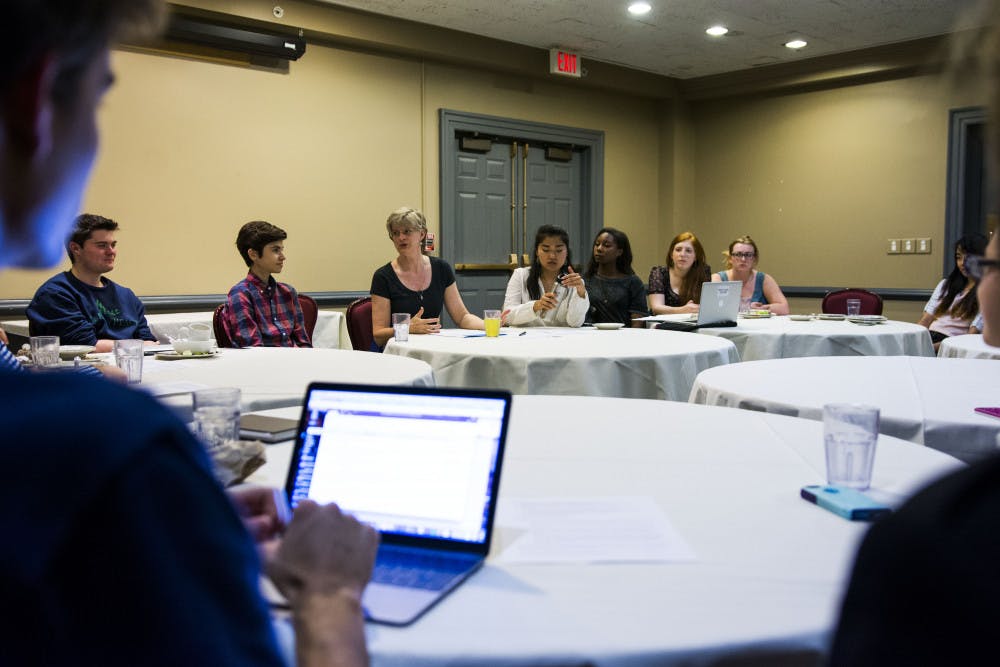The Undergraduate Council of Students released a statement of solidarity with students affected by the recent publication of two racist Herald opinions columns at its general body meeting Wednesday.
The UCS Executive Board drafted the three-sentence statement, which was amended through discussion and approved through an electronic vote by the general body.
“The Undergraduate Council of Students stands in solidarity with students of color in the wake of racist publications in The Brown Daily Herald this week,” the statement reads. “We join fellow students in urging The Herald to hold itself accountable for its actions. UCS pledges to attend the demonstration organized by Native Americans at Brown on Monday, October 12th to support and amplify the voices of students of color who have been silenced.”
UCS President Sazzy Gourley ’16 emphasized the need for productive conversation in the wake of the publication of the two columns. “There’s a huge need for more learning and dialogue in this area on campus,” he said. “We can all do our part by being informed about what’s going on.”
“It’s important that we recognize UCS’ role as part of campus conversations,” said UCS Chief of Staff Elena Saltzman ’16 while proposing the adoption of the statement.
The Herald published the columns — “The white privilege of cows” and “Columbian Exchange Day” — Monday and Tuesday, respectively. The Herald took down the second column and issued an apology in an editors’ note Wednesday. The first column built its argument on eugenics, a concept disproven by numerous scientific studies, and the second suggested that Native Americans should be thankful for the Columbian Exchange and thus celebrate Columbus Day.
The general body meeting was extended half an hour for the purpose of debate on the language and content of the statement.
Ryan Lessing ’17, UCS community and business relations liaison, expressed concern about the initial structure of the statement, suggesting that it might be advisable to avoid mentioning The Herald altogether and instead focus on UCS support for students of marginalized backgrounds.
Other members stressed the idea that UCS should support student groups that have issued statements on the columns. “We need to stand in solidarity with (the student groups’) statements, and they’ve all said that the BDH’s actions were a problem,” said Britt Edelen ’19, a UCS general body member.
Lessing also raised the issue of the short time frame over which the statement was introduced and passed. “I’m uncomfortable with general body members committing to something they haven’t had the time to process,” he said.
“Given the time-sensitive nature of the issue, we have to do it quickly,” Gourley responded. But the meeting was an inclusive space in which UCS members could ask questions and be part of the process of finalizing the statement, he said.
UCS devoted the rest of its meeting to a discussion of recommendations by the Alcohol and Social Event Committee and changes to the Student Code of Conduct. Interim Assistant Vice Presidents of Campus Life and Student Services MaryLou McMillan ’85 and Mary Grace Almandrez attended this portion of the meeting to brief the general body on the changes.
The most-discussed element of social event monitoring was the presence of graduate students in first-year dormitories on Friday and Saturday nights. McMillan said the role of the graduate students is primarily to help facilitate a safer living environment, not to discipline residents.
“They’re not putting their ears to people’s doors,” McMillan said. They will only actively intervene in “egregious situations,” she added.
“They’re helpful because they provide an extra pair of eyes to help students. They serve as a guide to help us acclimatize,” said Yvonne Diabene ’19. But more clarity regarding the identities and roles of the graduate students would have been helpful to alleviate student anxiety about the extent of their disciplinary power.
“It feels like a patrol,” said Lisa Schold ’19. “It would be helpful to know what the repercussions are.”
Almandrez outlined alterations to the Student Code, highlighting the move toward an investigator model for all higher-level cases, such as sexual misconduct cases, which are “complex or sensitive in nature.” Witness statements focusing on a particular person’s character will also be eliminated, she said.
A process of letter adjudication has also been introduced for lower-level violations, Almandrez said. Instead of the hearing process, a student accused of a lower-level offense now has the option to accept the charges without going through a dean’s hearing, she said.





